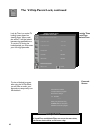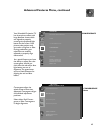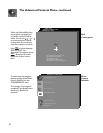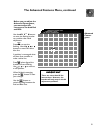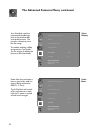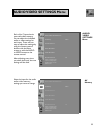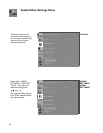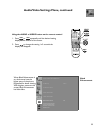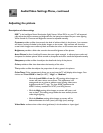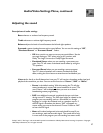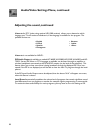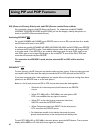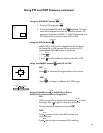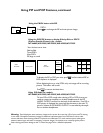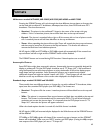
56
IRIS
™
is the Intelligent Room Illumination (light) Sensor. When IRIS is on, your TV will automati-
cally adjust the picture contrast and brightness for the best picture based on your room lighting.
When turned on, Contrast and Brightness cannot be adjusted manually.
Contrast provides a slider that controls the level of white-to-black in the picture. Low contrast
will show a variety of shades in the darker images on the screen. High contrast will show the
screen’s dark images more uniformly black and make the colors on the screen seem more vibrant.
Brightness provides a slider that controls the overall brightness of the picture.
Auto Picture for Ant-A and Ant-B, senses the tuner signal strength. It adjusts picture color and
sharpness for the best picture. When turned on, sharpness and color cannot be adjusted manually.
Sharpness provides a slider that adjusts the detail and clarity of the picture.
Color provides a slider that determines the intensity of the color.
Tint provides a slider that adjusts the proportion of red to green in the picture.
Color Temp (Color temperature) allows you to set how the TV will display white images. Your
choices are “Low 6500K or Low (for HD)”, “High” or “Medium.”
• With the Low 6500K or Low (for HD) setting, white images on-
screen will have a warm cast to them. This adjustment is an
average and can vary due to ambient room lighting, video scene
brightness and the TV’s age. The Low 6500K represents the
6500˚K industry standard for NTSC (non-HD) pictures.
• With the High setting, white images on-screen will have a cool
cast to them. This setting may provide the most realistic picture
under bright lighting.
• With the Medium setting, white images on-screen will be
balanced between the Low (warm) and High (cool) settings.
Video Noise reduces minor video noise (graininess) in the broadcast or input signal.
Descriptions of video settings
Adjusting the picture
Audio/Video Settings Menu, continued



